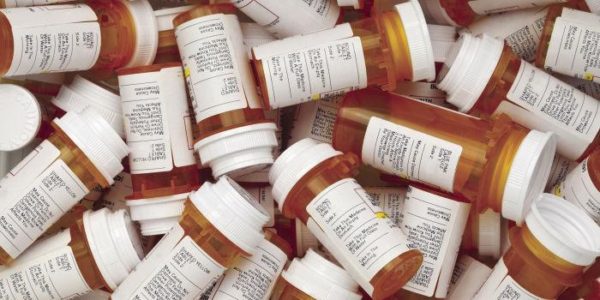Take back meds to be safe.
Take back meds to be green.
These are the messages delivered by the environmentalists and addiction specialists collaborating on a pharmaceutical spring-cleaning campaign across Milwaukee County.
Take Back My Meds MKE launched March 20, the first day of spring.
“Safely disposing of unused medicine during spring cleaning at a drop box … is something each of us can do to combat the opioid crisis and protect Lake Michigan,” said Hashim Zaibak, CEO of Hayat Pharmacy and a founding member of the Take Back My Meds MKE coalition.
The coalition consists of 15 community groups and businesses and its mission is to make it easier for people to dispose of unused medicine safely. Members include health-focused groups such as Sixteenth Street Community Health Centers and AIDS Resource Center of Wisconsin, public policy organizations such as Citizen Action of Wisconsin, and environmental groups, including Milwaukee Riverkeeper and Clean Wisconsin.
Uniting these groups are two basic concerns: Leaving unused drugs in a medicine cabinet creates an opportunity for abuse, while flushing unused drugs down a toilet or drain puts them into waterways, where they endanger both aquatic and human health.
“The inappropriate disposal of prescription medication is a huge area of concern. The compounds and chemicals from our prescriptions and over-the-counter medications pollute our water supply when we flush them down the toilet or dump them in the garbage. When not disposed of properly, the chemicals and heavy metals these drugs often contain can remain in our water supply, harming aquatic life and human health,” cautions Clean Wisconsin.
“When Milwaukee County residents flush unused medicine down the toilet, it goes straight into Lake Michigan because MMSD is unable to treat it,” Amber Meyer Smith, vice president of programs and government relations for Clean Wisconsin, stated.
She advised, “Using a drop box or mail back envelope keeps unused medicine out of Lake Michigan, the source of drinking water in Milwaukee County.”
Take Back My Meds MKE, at takebackmymeds.com, has mapped drop boxes or disposal envelopes for unused medicine at 76 locations.
Opioid addiction often starts at home
Of particular interest to the Take Back My Meds MKE coalition is the proper disposal of unused opioids.
Out of 125 million U.S. households, an estimated 25 percent have opioids in them.
In the Milwaukee area, data from the U.S. Centers for Disease Control and Prevention shows 7.7 opioid prescriptions were dispensed for every 10 residents in 2016.
And last year, at least 336 people in the county died from drug overdose deaths — the majority of involving opioids.
One more statistic: 70 percent of opioid addictions are said to start at home, very often from unused medicine left in a cabinet.
“Keeping unused medicine in your house is asking for trouble,” said Michelle Jaskulski, an outreach director at Addiction Policy Forum who said her two sons used drugs in the home. “So please, get rid of it in a safe and responsible way.”
Research confirms harm
Studies show that at least two-fifths of households in the United States contain unused medicines. With an estimated 4.2 billion prescriptions written a year and about 40 percent of those medications going unused, there’s a massive supply of potentially dangerous compounds leaching into waterways across the country.
Research at the University of Wisconsin-Milwaukee School of Freshwater Sciences has already identified pharmaceutical compounds in Lake Michigan. A 2015 study at the school determined that metformin — a medication commonly taken for Type II diabetes that’s found in freshwater systems worldwide — can cause male fish to produce eggs.
Research conducted in cities in Illinois, Pennsylvania, Florida, Texas and Arizona found antibiotics, antihistamines and anti-seizure medication in waterways.
Studies link pharmaceuticals in the water to lower sperm counts or damaged sperm in fathead minnow and reproductive changes in walleye, carp and bass.
A 2003 study in Texas found two types of antidepressants in every bluegill, black crappie and channel catfish caught downstream from a wastewater treatment plant.
Earthworms found in sludge from wastewater plants have tested positive for antidepressants. So have bull sharks in the Caloosahatchee River in Florida.
And a growing body of research indicates medicine seeping into water supplies can harm humans as well.
Statewide and national efforts
Wisconsin’s Department of Justice is sponsoring Dose of Reality Week, April 22–29 to raise awareness of the ongoing effort to prevent prescription painkiller abuse in the state. Information about the week and medicine drop-off locations in communities beyond Milwaukee can be found at doseofrealitywi.gov.
Nationally, the Drug Enforcement Agency is sponsoring another prescription drug Take Back Day on April 28. Information can be found at takebackday.dea.gov.
On last November’s Take Back day, a record-setting 912,305 pounds — 456 tons — of expired, unused and unwanted prescription drugs were collected for disposal at more than 5,300 collection sites.
In April 2017, about 450 tons of drugs were collected on Take Back day.
